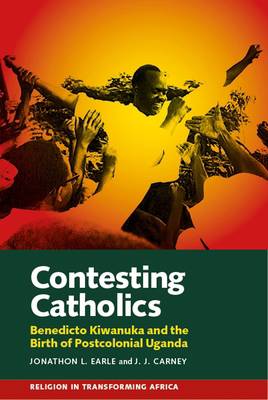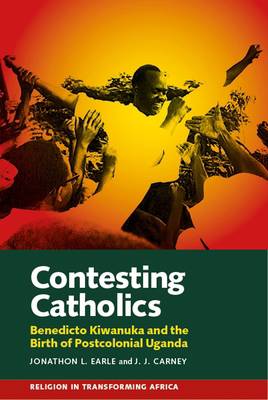
- Afhalen na 1 uur in een winkel met voorraad
- Gratis thuislevering in België vanaf € 30
- Ruim aanbod met 7 miljoen producten
- Afhalen na 1 uur in een winkel met voorraad
- Gratis thuislevering in België vanaf € 30
- Ruim aanbod met 7 miljoen producten
Zoeken
Contesting Catholics
Benedicto Kiwanuka and the Birth of Postcolonial Uganda
Jonathon L Earle, J J Carney
€ 177,45
+ 354 punten
Uitvoering
Omschrijving
Assassinated by Idi Amin and a democratic ally of J.F. Kennedy during the Cold War, Benedicto Kiwanuka was Uganda's most controversial and disruptive politician, and his legacy is still divisive. On the eve of independence, he led the Democratic Party (DP), a national movement of predominantly Catholic activists, to end political inequalities and religious discrimination. Along the way, he became Uganda's first prime minister and first Ugandan chief justice. Earle and Carney show how Kiwanuka and Catholic activists struggled to create an inclusive vision of the state, a vision that resulted in relentless intimidation and extra-judicial killings. Focusing closely on the competing Catholic projects that circulated throughout Uganda, this book offers new ways of thinking about the history of democratic thought, while pushing the study of Catholicism in Africa outside of the church and beyond the gaze of missionaries. Drawing on never before seen sources from Kiwanuka's personal papers, the authors upend many of the assumptions that have framed Uganda's political and religious history for over sixty years, as well as repositioning Uganda's politics within the global arena.
Fountain: Uganda
Fountain: Uganda
Specificaties
Betrokkenen
- Auteur(s):
- Uitgeverij:
Inhoud
- Aantal bladzijden:
- 266
- Taal:
- Engels
- Reeks:
Eigenschappen
- Productcode (EAN):
- 9781847012401
- Verschijningsdatum:
- 16/04/2021
- Uitvoering:
- Hardcover
- Formaat:
- Genaaid
- Afmetingen:
- 156 mm x 234 mm
- Gewicht:
- 548 g

Alleen bij Standaard Boekhandel
+ 354 punten op je klantenkaart van Standaard Boekhandel
Beoordelingen
We publiceren alleen reviews die voldoen aan de voorwaarden voor reviews. Bekijk onze voorwaarden voor reviews.







